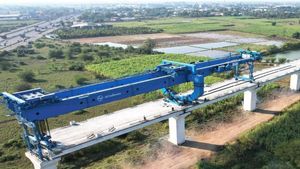The South Korean Ministry of Strategy and Finance has unveiled new economic policies aimed at bolstering the country's economy amid increasing global challenges. The announcement, made by Minister Choo Kyung-ho, highlights several strategic measures intended to stimulate economic growth, support vulnerable sectors, and stabilize the financial environment.
According to the Ministry's report, significant emphasis will be placed on sectors hardest hit by the pandemic and recent global economic downturns. The policies aim to provide financial relief and support, ensuring stability and gradual recovery. "Our focus is on creating sustainable growth opportunities and supporting those who have been disproportionately impacted by the recent economic fluctuations," Choo stated during the press conference.
The new measures include increased investment in digital infrastructure and green technologies, showcasing South Korea's commitment to transitioning toward eco-friendly economic practices. With international discussions surrounding climate change and sustainability gaining momentum, these policies position South Korea as a proactive participant on the world stage.
Choo added, "We acknowledge the pressing need for our economy to adapt to new realities. By investing in green technologies and digital infrastructure, we are not only preparing for future challenges but also setting the foundation for innovative growth." Acknowledging the current inflationary pressure, the Minister assured citizens of the government's commitment to maintaining price stability.
Critics, on the other hand, have raised concerns about the feasibility of these ambitious policies, especially amid rising inflation rates and supply chain disruptions. Economic analysts point out potential risks associated with overly ambitious spending plans without clear strategies for long-term returns. Jong-soo Lee, chief economist at the Seoul National University, commented: “While the focus on green initiatives is commendable, the government must balance expenditures across all sectors to avoid exacerbated economic disparities.”
The government's new economic policy is not only tasked with responding to immediate economic pressures but is also expected to lay groundwork for long-term growth. With many economists projecting slower than desired recovery rates, these policies represent both hope and caution. Lee emphasized the necessity for continued assessment of policy impacts, stating, “Regular evaluations will be key to ensuring these policies deliver on their promises.”
While the government remains optimistic about achieving defined growth targets, the challenges before them are substantial. Rising global commodity prices and energy costs have created additional hurdles for households and businesses alike. The Ministry of Strategy and Finance has responded by pledging assistance to low-income families and support for small enterprises facing hardships.
"These are not mere short-term fixes; they are integral to building resilience," asserted Choo, referencing the structural changes necessary to bolster the economy's foundations for future challenges. One key aspect of the new policy framework also addresses labor market changes, aiming to create job opportunities through public works and skill development programs.
The Minister's announcement has stirred varied reactions across the political spectrum. Advocates for social welfare initiatives have praised the government's intentions to safeguard vulnerable populations. Still, opposition parties question whether these measures comprehensively address inflation and job creation. This tension highlights the delicate balance the current administration must maintain to satisfy diverse stakeholder interests.
By actively engaging various societal sectors, including businesses and non-profits, the government seeks collaboration for implementing the new economic policies effectively. Opportunities for dialogue and feedback have been established, allowing for adjustments based on public response and economic performance evaluations.
Responding to concerns about bureaucratic inefficiencies, the Ministry has assured streamlined processes for policy implementation. It remains committed to transparency, inviting stakeholders to track progress and voice concerns as these policies roll out.
Looking forward, the Ministry of Strategy and Finance aims to present regular updates on the economic policies' effects, fostering trust and accountability within the governing bodies and among the public. Choo summarized the importance of community involvement, stating, "A strong economy is built on collaboration between the government and its citizens. We are all stakeholders in our economic future.”
The Ministry's new economic policies signal both hope and challenges for South Korea. The delicate balance of ambition and realism will shape the nation's economic fabric as it navigates through these transformative times. The proposed measures could set the country on a path of substantial recovery and growth if effectively implemented and received.



